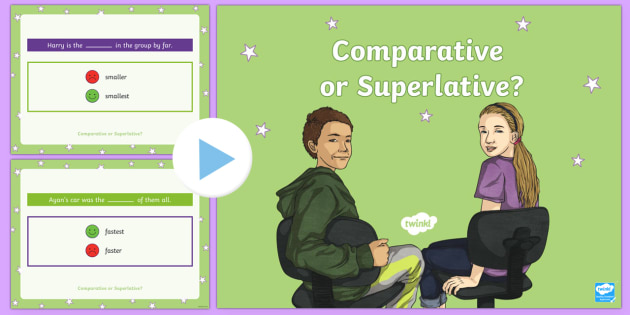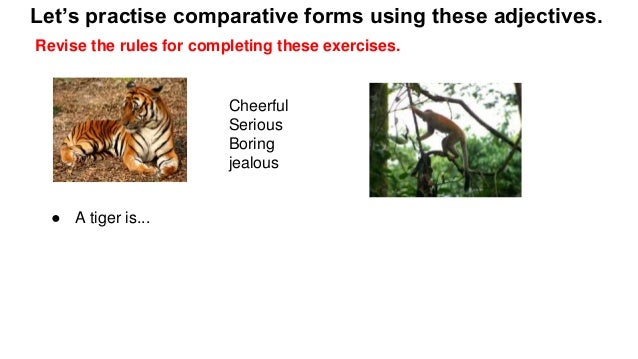When we talk about two things, we can 'compare' them. We can see if they are the same or different. Perhaps they are the same in some ways and different in other ways. We can use comparative adjectives to describe the differences.
EVALUATION CRITERIAL. Comparative negligence: n. A rule of law applied in accident cases to determine responsibility and damages based on the negligence of every party directly involved in the accident. For a simple example, Eddie Leadfoot, the driver of one automobile is speeding and Rudy Airhead, the driver of an oncoming car has failed to signal and starts to. Comparative adjectives Comparative adjectives are used to compare differences between the two objects they modify (larger, smaller, faster, higher). They are used in sentences where two nouns are compared, in this pattern: Noun (subject) + verb + comparative adjective + than + noun (object). The second item of comparison can be omitted if it is clear from the context (final. Smile(U2)Gravity is not pulling meI won't be a picture with no signDecaying I'm prayingYou are my abbotI need the ground to kneel uponAnd love can't be your songI don't want to see you smileI'm breaking it taking itI'm breaking it slowly in mindI'm seeing it freeing itI know love is in this soul of mine.

In the example below, 'bigger' is the comparative form of the adjective 'big':
A1A2
A1 is bigger than A2.
Formation of Comparative Adjectives
There are two ways to make or to 'form' a comparative adjective:
- short adjectives: add '-er'
- long adjectives: use 'more'
| Short adjectives: add -er | examples |
|---|---|
| 1-syllable adjectives | old, fast |
| 2-syllable adjectives ending in -y | happy, easy |
| RULE: add '-er' | old → older |
| Variation: if the adjective ends in -e, just add -r | late → later |
| Variation: if the adjective ends in consonant, vowel, consonant, double the last consonant | big → bigger |
| Variation: if the adjective ends in -y, change the y to i | happy → happier |
| Long adjectives: use more | examples |
|---|---|
| 2-syllable adjectives not ending in -y | modern, pleasant |
| all adjectives of 3 or more syllables | expensive, intellectual |
| RULE: use 'more' | modern → more modern expensive → more expensive |
quiet → quieter/more quiet
clever → cleverer/more clever
narrow → narrower/more narrow
simple → simpler/more simple
good → better
well (healthy) → better
bad → worse
far → farther/further
Use of Comparative Adjectives
We use comparative adjectives when talking about 2 things (not 3 or 10 or 1,000,000 things, only 2 things).
Often, the comparative adjective is followed by 'than'.
Look at these examples:
- John is 1m80. He is tall. But Chris is 1m85. He is tallerthan John.
- America is big. But Russia is bigger.
- I want to have a more powerful computer.
- Is French more difficult than English?

If we talk about the two planets Earth and Mars, we can compare them as shown in the table below:
| Earth | Mars | ||
|---|---|---|---|
| Diameter (km) | 12,760 | 6,790 | Mars is smaller than Earth. |
| Distance from Sun (million km) | 150 | 228 | Mars is more distant from the Sun. |
| Length of day (hours) | 24 | 25 | A day on Mars is slightly longer than a day on Earth. |
| Moons | 1 | 2 | Mars has more moons than Earth. |
| Surface temperature (degrees Celsius) | 22 | -23 | Mars is colder than Earth. |
 two things (not three or more things), in fact one or both of the things may be a group of things.
two things (not three or more things), in fact one or both of the things may be a group of things.- Mt Everest is higher than all other mountains.
Comparative adjectives are used to compare one noun to another noun. In these instances, only two items are being compared. For example, someone might say that 'the blue bird is angrier than the robin.'
Superlative adjectives are used to compare three or more nouns. They're also used to compare one thing against the rest of a group. Superlative adjectives demonstrate a higher level of comparison between entities. For example, 'She's the prettiest princess in all the land.'
When students are trying to organize their thoughts and draw a comparison between two or more items, it's helpful to show them several examples of comparative and superlative adjectives for kids. Let's explore some examples below.
Comparative and Superlative Adjectives
An initial adjective (also called a positive adjective) on its own describes a noun. Take, for example, 'He's tall.' The comparative adjectives in the printable below show how you can make comparisons easily between two entities by adding -er for a comparative adjective: 'He's taller than she is.' The superlative adjective, adding -est, makes even higher levels of comparison: 'He's the tallest kid in the class.'
View & Download PDF
Degrees of Comparison
It's wise to review the degrees of comparison examples with your students. In the examples above, it's clear there are varying degrees of comparison between new, newer, and newest.
Don't forget you can also make comparisons between two or more items with the words 'more' and 'most.' For example, 'She is more active than he is' offers a lesser degree of comparison than 'She is the most active person in the entire household.'
Comparisons can also be made in the opposite direction with 'less' and 'least.' The same principle applies in the examples below. You can compare two things in the comparative form as well as three or more in the superlative form.
View & Download PDF
Adjectives With Irregular Forms
There are a few adjectives that have irregular forms when made into comparative or superlative adjectives. With these, you don't add an -er or -est, and they don't include the words 'more' or 'most.' In some cases, a whole new word is used. These irregular forms just have to be memorized.
Comparative And Superlative Exercises
The examples in the printable above still follow the format of initial adjective, comparative adjective, and superlative adjective, as in good, better, best.
Sentences With Comparative Adjectives
Now that we know how to identify comparative and superlative adjectives, let's see them in action. Here is a list of sentences making comparisons between two things:

- My house is bigger than yours.
- Your grade is worse than mine.
- The Pacific Ocean is deeper than the Arctic Ocean.
- You are more polite than Joey.
- My brother is taller than I am, but he is older too.
- A rose is more beautiful than a daisy.
- The Earth is larger than the moon.
- A pint is less than a quart.
- Learning Japanese is more difficult than learning Italian.
- It's farther from New York to Austin than it is from New York to Nashville.
Sentences With Superlative Adjectives
Of course, there are times when we take things up a notch and compare three or more items. There will also be times when we compare one thing against the rest of a group. Here are some examples of superlative adjectives in action:
- I can't find my most comfortable jeans.
- The runt of the litter is the smallest.
- Jupiter is the biggest planet in our solar system.
- She is the smartest girl in our class.
- This is the most interesting book I have ever read.
- I am the shortest person in my family.
- Jerry is the least worried about the game.
- That was the best movie ever.
- Sam is the most handsome boy in the whole school.
- Mount Everest is the highest mountain in the world.
Comparative Goodness
Especially for younger students, 'more' and 'most' can get tricky. Have you ever cringed at the thought of something being 'more better'? That's okay. An active mind makes many mistakes on the pathway to greatness. As you prepare to teach your little ones about the wonders of comparison, these lesson plans are a great place to start.
English Comparative And Superlative

M.A. Education
